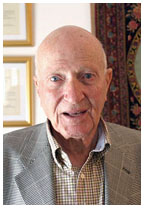|
Web Exclusives: Alumni Spotlight July 19, 2006:
The first in many ways A distinguished Muslim citizen of Israel whose career has spanned cultures and continents, Subhi Abu-Gosh *65 has often journeyed independently. He studied Islamic law on his own to qualify as a judge of Israel’s Islamic courts, and in time he rose to a chief judgeship. His career in the judiciary spanned from 1971, when the minister of religious affairs appointed him director of Islamic courts, to his retirement in 1997. These courts have jurisdiction over issues of personal status of Muslims, including marriage, divorce, and inheritance. He had traveled in his own direction before. Prior to taking up Islamic law, Abu-Gosh earned degrees from Brandeis University in Middle Eastern and Judaic studies and a doctorate in politics at Princeton. Over the years, Abu-Gosh has kept his links to Brandeis, taking part in conferences there from time to time. The connection began when a Brandeis faculty member who was doing anthropological research in and around Abu-Gosh’s town in the 1950s encouraged him to apply for a scholarship to the recently founded Jewish-sponsored university. His work at Princeton made him the first Arab citizen in Israel’s short history to earn a Ph.D. degree. Back in Israel, Abu-Gosh became the first Arab lecturer at Tel Aviv University, where he taught political science for seven years. A believing Muslim, Abu-Gosh stresses that Islam is “a moderate religion, not the way it is being portrayed to the world.” Fanatics can be found on all sides, he says. “I avoid the extremes.” He is unhappy about U.S. military activity in Iraq and Afghanistan. Despite his affinity for new challenges, Abu-Gosh declined when an Israeli political leader invited him to go into politics some years ago. “I couldn’t play that role,” Abu-Gosh reflects. “There’s a difference between being a political scientist and a politician.” Had he run for office, he would have enjoyed instant name recognition. The town of Abu-Gosh — a hillside town near Jerusalem that has borne his family name since the 17th century — is viewed as a symbol of coexistence and neighborly relations. Within the community, he is known for acts of charity and generosity, such as traditional gifts to newlywed couples, or discreet aid to someone ill in the hospital. Abu-Gosh, who turns 79 in August, says he is pleased with what
he has accomplished, but wishes he could have done more writing.
He has begun putting his thoughts down on paper. Almost every morning,
Abu-Gosh goes to Jerusalem and walks for three hours through the
streets of the ancient city that is holy to three major faiths.
Then he drives home and writes down ideas that came to him. He does
not let anyone read them — “not yet,” he says
— nor will he divulge their contents. Eventually, he says,
they are to form a book. By Joseph M. Hochstein ’55 Joseph M. Hochstein ’55 is a writer and editor in Tel Aviv, Israel.
|
||

